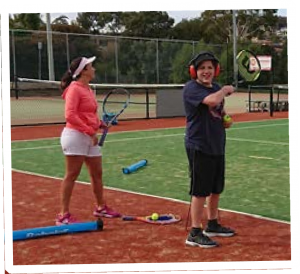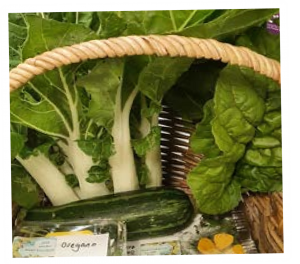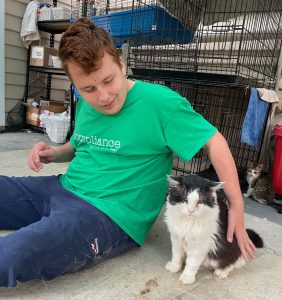 Published in PEPTalk Spring 2022 edition
Published in PEPTalk Spring 2022 edition
by Nicole Gates
Within the TASC framework, the ‘Preliminary to Level 1’ courses see learners engage in practical skills in a range of settings and have their learning differentiated to meet individual learning requirements. The framework can be used to identify and describe an individual’s performance in any of the core skills at a point in time. Its specificity makes it possible to identify a person’s areas of strength and need with some precision, so that training can be targeted to areas of need and an individual’s progress monitored over time. The framework can also be used to develop core skills profiles of learner cohorts.
Jack focused on Preliminary subjects in his final 2 years at school and was very proud to receive his Tasmanian Certificate of Educational Achievement. As his parents, we often discussed what would life look like for Jack after leaving school. Many young people with disability leave school with no plans for post school life and no links with any education, employment, or activities. This often results in young people remaining isolated in their homes, often resulting in social exclusion, dependency, and poverty.
There are a wide range of options available with none of them better than the next, but they should be viewed with the individual in mind and what is going to engage and sustain them beyond school life. For many, it involves University or further study, engaging with an employer either full time or part time, perhaps supported employment, owning your own business or volunteering. Jack had clearly articulated that he was done with formal education and always seemed to learn more in the doing.

As parents, we were very keen to explore what options existed and in the absence of suitable options, what sort of opportunities or individualised program we could create for Jack.
Jack is a young man who finished Year 12 at Southern Support School in 2021 but our planning commenced back at the beginning of December 2019, when Colin and I started the discussion about what will his life look like after school. What will he do? Where will he go? Who will he do it with? How do we keep him safe? How do we afford the support? What outcomes or goals did we want him to achieve? How could we support him to ensure he felt a sense of pride and achievement? All questions that we had no idea about at the time, nor did we have a clear idea on how to approach the task. We did know that we did not want Jack just sitting at home for hours on end, playing computer games, lounging around the house, watching TV or playing video games all day.
For a program to be successful, we felt it needed to come from a strength-based perspective – what does Jack enjoy, what is he good at, what motivates him? Jack needed purpose and skill building in the areas of social connections and communication, health and fitness and activities of daily life such as cooking, household tasks and personal care. We wanted to fill his days with activities he loves and try to make it self-sustaining by making some pocket money to keep his passions going. Jack needs an individual program with 1:1 support as he is hyper mobile, has no awareness of safety, experiences behaviours of concern on occasions and has limited expressive language skills. The program needed to be specific enough so that Jack enjoyed what he was doing but had practical learning opportunities, with scope for spontaneous changes to activities if Jack’s interests took him elsewhere.
I function better when things are written down, so I grabbed a dot journal book, and it became ‘the Book of Jack.’ Every time we had an idea, or saw something that took his interest, I wrote it in the book. We looked at what he enjoyed doing from his timetable at school and I spoke to all his key teaching staff, allied health specialists, GP, paediatrician, support staff and family members. We assessed how he was tracking against the preliminary and level 1 curriculum from TASC and what tasks he found engaging. I also had a page of who I needed to connect and talk to, such as Disability Employment Services and businesses that aligned with his hobbies and interests.

We soon saw a pattern as people reported that Jack looked forward to the gardening program and the multitude of activities it entailed such as sowing seeds, propagating, potting up, planting, growing, watering, harvesting, and composting. He loved collecting the eggs from the chooks, picking them up, feeding and watering them too. Jack has a natural affinity with animals. He is not scared, nor does he baulk at the biggest of emus or camels when visiting Zoo Doo. He loves his dog, cat and stick insects at home too. Jack loves a good science experiment and seeing things change state such as ice to water, water to steam or to see a reaction with the bicarb and vinegar when making volcanoes. Jack was also expanding his repertoire in the kitchen at school and home, learning how to use a Thermomix to prepare meals and condiments.
Shredding paper is a sensory friendly activity for Jack. From collecting the paper, lifting, and carrying to the shredder and then sitting down to shred and watch the paper fall into the catcher, it is a task which provides both heavy input and a calming stim. Jack also enjoyed work skills and PE at school.
When Jack had his NDIS plan review in December 2020, we requested 6 months’ worth of School Leaver Employment Support (SLES) which would provide funding to build Jack’s skills and confidence with a view to entering the workforce. The NDIS can fund SLES for up to two years, depending on the participant’s circumstances. The SLES funding can be used to develop skills to help participants get ready for employment. These skills include money handling skills, time management skills, communication skills, discovery activities, work experience, job ready skills, travel skills and personal development skills.
After speaking with Southern Support School, Friday was identified as being the most appropriate day to not attend the classroom but to go and explore options and start the transition process for life after school. We hatched a plan that commenced in the later part of the year, where Jack would go and test and try different activities with a support worker. We developed a targeted recruitment program for a new support worker to join Jack’s team to assist him with these activities. The approach was to ensure that Jack started to develop new habits so by the time he left school, some activities and locations were already familiar to him and therefore the transitions would be easier, and we were not trying to introduce an entirely new program, all at once. Knowing how Jack usually copes with transitions and routines, we also decided that he would not have the usual school holiday break but commence his new program, in the first week of January.
We duplicated the same visual supports that Jack used in his classroom, for use at home as this helped Jack to understand what activities and tasks were required to be completed at different times of the day. This included:
- 2 weekly visual calendars
- Days of the week, weather, and clothing choices
- Who, where and when visuals?
- Morning, afternoon, and evening chore lists and
- “I am working for” visual reward charts.
We planned and communicated with Jack’s support staff, so that we staggered the order of implementation for each activity and task so Jack could start practicing before leaving school, so transition was not coming at him all in one hit.
His new activities outside of school included Gym sessions with a personal trainer, tennis lessons, testing out experiences, employing support workers with key qualifications such as swim instructor, gym junkie, fishing expert but we are still looking for a gardening guru! In the meantime, I have been brushing up on the Yates Gardening bible and Tasmania’s own Peter Cundall’s pearls of wisdom. Jack enjoys bushwalking, geocaching and guided cooking with the Thermomix. We have attempted Parkrun but there were just too many people for Jack to manage so will give that a rest and try again later. In the meantime, he does a weekly walk on the Montrose track that Parkrun follows so it becomes a familiar location.
The Book of Jack contained a list of resources and equipment that we would need to acquire, categorizing it into immediate, ongoing, and later needs. Some of these items would be funded from Jack’s Disability Support Pension, with others being acquired through donations and community assistance. Items such as black plastic pots, empty cherry tomato plastic containers, plant cuttings, donation of excess produce, have recycle wherever possible.
Jack has a Facebook page called Jack and the Broad Bean Stalk. (His surname is Broadbent) This has been a fabulous vehicle to tell Jack’s story, welcome donations of excess produce, plant cuttings and containers, advise of events and general activities. We have been so fortunate that a local cartoonist has donated his time and designed Jack’s artwork and logo.

Jack’s chickens are arriving this weekend as we have been waiting eagerly for the backyard renovations to be completed. A level and low maintenance yard now has multiple raised vegetable garden beds, a chook run, shed and potting table installed.
Jack has been selling his produce, such as vegetables, picked herbs and potted herbs, indoor plants, succulents and handmade condiments via his Facebook page and Community Markets. The amazing organisers and stallholders of the HHMM – Hobart Handmade Makers Market have welcomed Jack and the Broad Bean Stalk crew with open arms. They embrace his diversity, encourage him to learn new skills and he is quickly becoming part of this awesome community. Please give the Jack and the Broad Bean Stalk and the HHMM Facebook pages a like, share in his adventures post school and perhaps make purchase or donation.
We continue to talk and connect with local business who are interested in working with Jack as we find opportunities that provide a win-win outcome. Michelle and Phillip Stephens funeral home are gratefully receiving Jack’s shredded paper to assist with their business. Jack has also been supplying keen gardeners at the Warrane Community Garden and the Kickstart Arts Community Garden with shredded paper for their compost piles. Currency Café in Lindisfarne has purchased produce from Jack to make delicious breakfast and lunch specials. We are working with the gorgeous Fran from True Colours Florist in Centrepoint to grow succulents for the terrariums they sell. Jack has been volunteering at the Tasmanian Animal Rescue and Sanctuary (TARS) in Cradoc where Jack is responsible for feeding animals, handling cats and kittens in preparation for rehoming, cleaning cages, paddocks and gardening activities.
We have been quite overwhelmed with the number of individuals and business who are keen to partner with Jack and support his business, social interactions and build connections with his community.

Jack continues to acquire skills in activities of daily life (ADL’s) such as tidying his bedroom, stripping and changing a bed, changing doona covers, dusting, vacuuming, washing dishes, stacking and emptying dishwasher, bathing, dressing, selecting clothes for the day depending on the weather and activities he has planned. I am still convinced there is a need for a badge which says “I dressed myself” today. Jack in conjunction with his wonderful support staff have helped him to learn how to load washing machine, hanging out clothes, cook his favourite basic lunch and dinner recipes after selecting which menu item he wishes to make, does the shopping and uses his visual recipe books or guided cooking functions on the Thermomix. All task that will ensure he has independence in his life.
As with all new processes, we continually evaluate what works well, what other options we can explore and how it fits into Jack’s goals each week, month or year. Sometimes it pushes him out of his comfort zone but without stretching those boundaries a little bit each time, Jack will never get practice at being comfortable in new setting or with new social interactions. On occasions I have underestimated the skill set that is required in certain circumstances. As an example, we have resumed working with a Speech Therapist to practice saying hello, goodbye and thank you with customers at his monthly markets, initially using Prologue2go on his iPad but I am hoping eventually he will find his voice in this type of setting. We never underestimate what Jack is capable of and will always attempt rather than dismiss as not being a suitable opportunity. If we don’t have the occasional failure, I believe that we are not trying hard enough. Education should never cease throughout life. Jack enjoys a variety of methods to reinforce a concept by using videos, books, worksheets, stories, and live experiences. These mediums provide fabulous vehicle which continues to build a full life, build capacity, and empower Jack to be the best version of himself. Regardless of the capabilities of our children and young adults, Colin and I constantly strive to teach our children how to be an adult, participate in community life, make lifelong connections and social interactions, and develop meaningful friendships. We invite the community in and educate how we are all not the same but each of us have something incredibly valuable to contribute.
My mantra has become practice, refine and reset.
